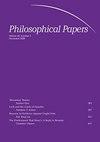Introduction
IF 1.3
3区 哲学
0 PHILOSOPHY
引用次数: 0
Abstract
Theorizing about world government has a long and pedigreed history. Formulations of some version of the idea already appear in Chinese, Indian as well as ancient Greek thought and later supporters include Dante and Erasmus (while others, such as Bentham and Kant, offered qualified support only). Today the idea appears to enjoy a small renaissance (as it did, briefly, after the Second World War for, perhaps, obvious reasons). This is not surprising. The world is encountering several global existential challenges, among them climate change, global injustice, and the threat of (nuclear) war. Some, such as Luis Cabrera (2004) or Torbjörn Tännsjö (2008), think that there is only one adequate answer to these challenges: to create a world state that governs the entire globe. Does the ‘world’ agree? For a long a time after the last great war it looked like it did (or, to be more precise, that it was in ‘qualified agreement’): for many decades after 1945, the world has seen the continuous development of multilateral, international, supranational institutions, the crowning achievement of which, arguably, was the setting up of the European Union. Of course, all these developments fell well short of anything like a world government, but one could see—especially if one wanted to, driven by, for example, certain theoretical assumptions or commitments—a perhaps inevitable path to this ultimate end-state.介绍
关于世界政府的理论化有着悠久的历史。在中国、印度和古希腊的思想中,已经出现了这种观念的某些版本,后来的支持者包括但丁和伊拉斯谟(而其他人,如边沁和康德,只提供了有条件的支持)。如今,这一理念似乎迎来了一次小小的复兴(就像二战后的短暂复兴一样,原因或许显而易见)。这并不奇怪。世界正面临着几个全球性的生存挑战,其中包括气候变化、全球不公正和(核)战争的威胁。一些人,如Luis Cabrera(2004)或Torbjörn Tännsjö(2008),认为应对这些挑战只有一个适当的答案:创建一个统治整个地球的世界国家。“世界”同意吗?在上一场大战之后的很长一段时间里(或者,更准确地说,是在“有条件的协议”中),它看起来确实如此:1945年之后的几十年里,世界见证了多边、国际、超国家机构的不断发展,其中的最高成就,可以说是欧盟的成立。当然,所有这些发展都与世界政府相去甚远,但人们可以看到——特别是如果人们愿意,例如,在某些理论假设或承诺的推动下——通往最终最终状态的一条可能不可避免的道路。
本文章由计算机程序翻译,如有差异,请以英文原文为准。
求助全文
约1分钟内获得全文
求助全文
来源期刊

Philosophical Papers
PHILOSOPHY-
CiteScore
2.10
自引率
0.00%
发文量
18
期刊介绍:
Philosophical Papers is an international, generalist journal of philosophy edited in South Africa Original Articles: Articles appearing in regular issues are original, high-quality, and stand-alone, and are written for the general professional philosopher. Submissions are welcome in any area of philosophy and undergo a process of peer review based on initial editor screening and refereeing by (usually) two referees. Special Issues: Topic-based special issues are comprised of both invited and submitted papers selected by guest editors. Recent special issues have included ''Philosophy''s Therapeutic Potential'' (2014, editor Dylan Futter); ''Aging and the Elderly'' (2012, editors Tom Martin and Samantha Vice); ''The Problem of the Criterion'' (2011, editor Mark Nelson); ''Retributive Emotions'' (2010, editor Lucy Allais); ‘Rape and its Meaning/s’ (2009, editor Louise du Toit). Calls for papers for upcoming special issues can be found here. Ideas for future special issues are welcome.
 求助内容:
求助内容: 应助结果提醒方式:
应助结果提醒方式:


